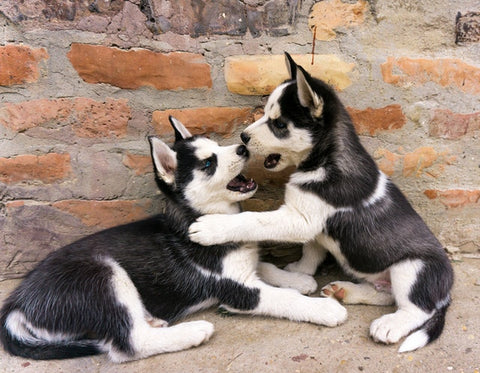Watching dogs play always brings a little joy and smile into our lives, but do we know why they like to play?
It turns out that play fulfills many needs. British researchers consider 4 theories to explain why dogs play.
-
Play improves dogs' motor skills
They play follow-the-leader, roll over on the floor, climb on objects, pick up objects in their mouths, shake them or bite them. Puppies also learn jaw strength by biting their brothers and sisters.
Through all this play, puppies learn important skills that help them learn how to move, how to find food, and how to defend themselves from other puppies.

-
Play teaches them to deal with the unexpected and danger
Through play, puppies learn to manage their body movement when they are jostled, off-balance and to manage their reaction to something unexpected or frightening.
Researchers have studied changes in the dogs' brains and hormone levels when they play, and these experiences are believed to help dogs better manage the stressful moments in their lives.

-
Playing increases sociability in dogs
Dogs are thought to play with each other to build friendships, similar to the way humans do.
Dogs prefer to play with people they know and are more likely to approach the winner(s) of a previous game, but there is no dominance established between a winner and the other participants in the game. The game here is a way of building friendships, not social rank.

-
Play is a side effect of boredom
A dog that has too much energy or is bored uses play as a release. This theory, however, is the only one that has not been proven by science. If this were the case, then not all dogs would play, because not all dogs are bored.

Some dogs will not have had the opportunity to experience play as much as others, so it's important to know the difference between play and fighting. You can tell the signs by your dog's attitude and body language.
In summary, play is fundamental for dogs to develop motor skills, prepare them for stressful moments and build social relationships with their four-legged companions but also with their humans.
An important point to note is that a dog that plays is not necessarily a healthy dog, so pay attention to the signs that your dog sends you, and consult a veterinarian if you have any doubt about the health of your dog!
See you next time on The Pets Ark !
The Pets Ark family


